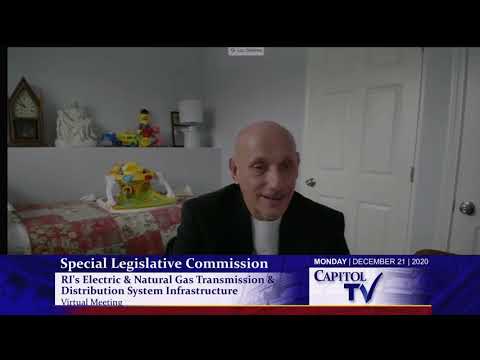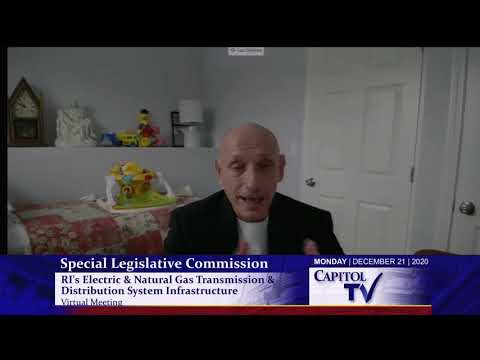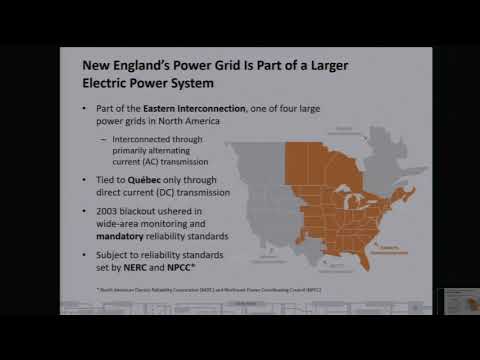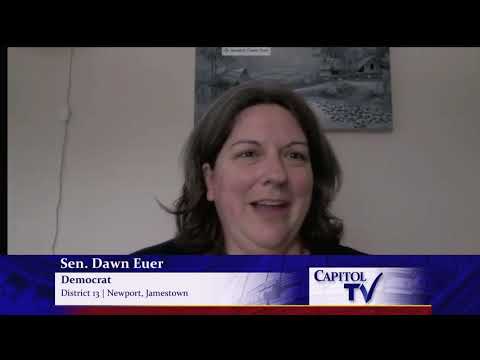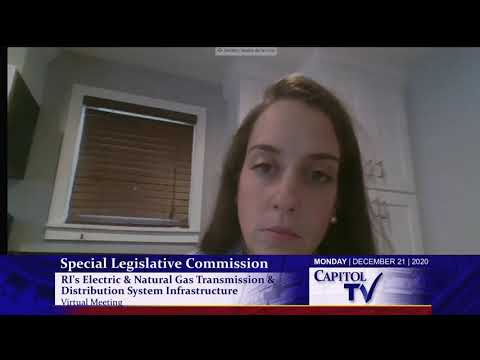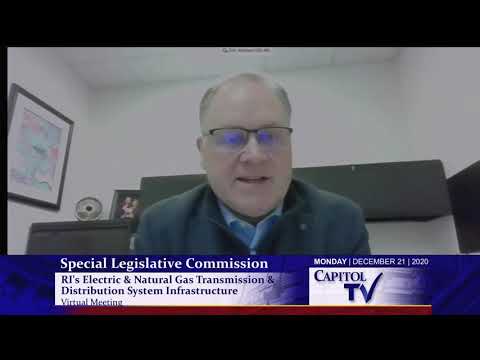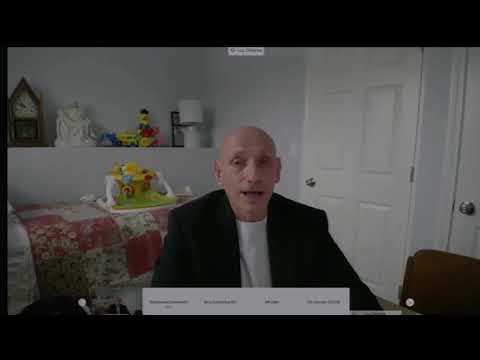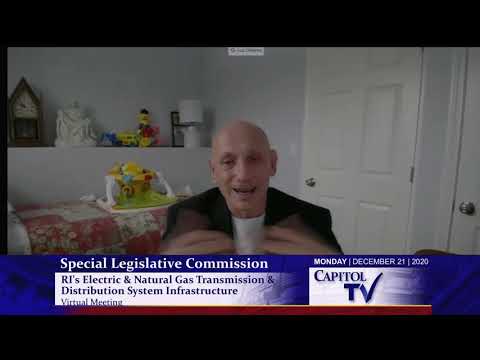First meeting of the Senate Energy Transmission Commission – Full video
“We are not, as an organization, expecting any further fuel or natural gas infrastructure to be developed here in New England,” said ISO-New England’s Eric Johnson.
December 29, 2020, 12:17 pm
By Steve Ahlquist
The first meeting of the Special Legislative Commission to Study and Evaluate Rhode Island’s Electric and Natural Gas Transmission and Distribution System Infrastructure (Commission) met on December 21. UpriseRI wrote about the Commission ahead of this meeting here, and Tim Faulkner at EcoRI wrote up his thoughts on the first meeting here. This piece presents all the video from the hearing, with a few observations thrown in.
The quick and dirty recap is that the Commission is tasked with studying and evaluating the state’s energy transmission systems, with an eye towards the future, but the Commission was formed without any members who can speak to the environmental and climate change impacts of our continued reliance on fracked gas.
Senator Louis DiPalma (Democrat, District 12, Little Compton, Middletown, Newport, Tiverton) wrote the legislation to create the special committee, and now chairs it. DiPalma pushed the legislation through the Senate Commerce Committee, which he chairs, and did not put the legislation through the Senate Environmental and Agriculture Committee, where the legislation would certainly gotten more notice from Rhode Island’s many environmental groups interested in a future without fossil fuels. CLF sent in written testimony asking for two environmental seats on the commission, and offered the support of CLF. This was refused.
No public comment was allowed at this meeting, and it will not be allowed at the next meeting either. Senator DiPalma opened the hearing by allowing all members to introduce themselves. Notable for his absence was William Horan, who Uprise RI noted is an outspoken critic of environmentalism, and a proponent of fracked gas, so-called “clean” coal and nuclear energy.
Senator DiPalma reviewed the charge of the commission, reading from the bill he wrote. Though the charge of the Commission is to ensure reliable electric and natural gas infrastructure delivery system in Rhode Island, Senator DiPalma said that it is also important to be aware of the state’s 2030 and 2050 goals “with regards to renewables,” adding that this needs to be the “context” through which the Commission must look at things.
Senator DiPalma talked about the increased use of renewable energies like solar and wind, but continues to talk about ensuring a reliable natural gas infrastructure. He admits that fossil fuels will run out day (but waiting for a time when there are no more fossil fuels to burn would be catastrophic for the planet, since burning all known fossil fuel deposits will ensure an extinction level climate change disaster).
On a more positive note, Senator DiPalma also spoke about the need to build a more robust electrical grid, one that can allow for the transmission of behind the meter solar to neighboring homes and businesses, among other advantages. Coming up with a way to pay for these improvements, especially since National Grid has little to no incentive to do so, is a big challenge.
The presentation was from Eric Johnson, Director of External Affairs at ISO-New England and Kerry Schlichtung, a member of the External Affairs team. ISO-New England has been responsible for overseeing power system of all six New England states since 1997. ISO’s sole responsibility is reliability – that is, their job is to make sure that New England gets the energy they need, in real time and on demand, every day, as cheaply as possible.
To do this, ISO runs auctions in which power companies bid to deliver energy at the lowest possible cost. ISO is neutral when it comes to the technology used to create power. That is, the cheapest energy electricity supplier is always the one ISO will go with, whether that be clean wind energy or dirty coal. (That said, there are no coal burning power plants operating in New England anymore.)
ISO has three major operations:
- Grid Operation, which can be seen as the “Mission control” of energy distribution in New England;
- Market Administration, where ISO runs the energy futures market that determines the future of the source and pricing of electricity; and
- Power System Planning, where ISO looks into the future and tries to predict where our energy markets and new technologies will be over the coming decade.
There are about 350 power plants in New England, the largest are nuclear (located in New Hampshire and Connecticut) followed by fracked gas plants throughout the region. This mix is constantly changing. A number of power plants are retiring because they are “uneconomic” or past their designed life expectancy. Also, a number of big wind projects are projected to come on board.
Energy use in New England peaked in 2006. This is largely due to investments in energy efficiency made by states and suppliers. Also, there is behind the meter solar, which is taking significant demand off the grid as energy consumers generate their own electricity.
The region’s dependence on fracked gas means that we are subject to high levels of price volatility. That is, gas prices rise and fall depending on the weather. When it gets colder, we use more fracked gas, raising prices. The phenomenon of price volatility in New England “is likely to continue as long as we have to operate within the existing fuel infrastructure in the region,” said Director Johnson. “We are not, as an organization, expecting any further fuel or natural gas infrastructure to be developed here in New England.”
The move away from fossil fuels in New England has nothing to do with national policy. Remember, ISO-New England is neutral when it comes to the source of power, and ISO is overseen by the Federal Energy Regulatory Commission (FERC). Instead, this change is due to an effort by the states to reduce greenhouse gas emissions by changing the emission standards. We should not, contra former Speaker of the House Nicholas Mattiello‘s statement, count out the ability of the states to counter climate change. The reductions in greenhouse gases that have taken place in our region since 2001 was accomplished by tepid reforms. More aggressive standards would have more robust impacts.
The first question for the ISO-New England representatives was from Senator Dawn Euer (Democrat, District 13, Newport, Jamestown) who recently took over as Chair of the Senate’s Environment and Agriculture Committee.
Euer asked the representatives about a letter, sent in October, from every New England governor except for New Hampshire’s Chris Sununu, calling for ISO-New England to expand its considerations beyond mere reliability, to include “climate and environmental concerns.” Euer pointed out that the externalities of our current energy production are borne by frontline communities, (such as those who live around the Port of Providence where fossil fuel expansion and pipeline explosions threaten poor people of color.)
ISO’s singular focus on reliability is encoded into the organization’s DNA by FERC, said Director Johnson. Changing that involves developing a plan with stakeholders (including power company and grid operators) and bringing a plan to the federal agency for approval.
Though he didn’t explicitly say so, Director Johnson seemed to dismiss this idea as he moved onto a more likely scenario where ISO-New England develops a clean energy futures market that would exist alongside the more conventional energy futures market it already maintains.
Senator Jessica de la Cruz (Republican, District 23, Burrillville, Glocester) asked clarifying questions.
Questions from Jeffrey Diehl, who leads the Rhode Island Infrastructure Bank.
Senator DiPalma with questions:
Wrapping up:
See also:




